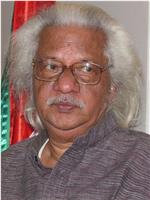阿多尔·柯普莱克里什汗 Adoor Gopalakrishnan

- 性别:男
- 获奖: 主竞赛单元 金狮奖 / 费比西奖 竞赛单元费比西奖
- 星座:巨蟹座
- 出生日期:1941-07-03
- 出生地:印度,喀拉拉邦,Adoor
- 职业:导演 / 编剧 / 制片人
阿多尔·柯普莱克里什汗简介
获奖情况
第47届威尼斯电影节 获得主竞赛单元 金狮奖 (提名)。获奖影视: 《墙》
第47届威尼斯电影节 获得费比西奖(国际影评人联盟奖) 竞赛单元费比西奖。获奖影视: 《墙》
影人资料
Adoor Gopalakrishnan is India's most acclaimed contemporary filmmaker. Born in 1941 in Kerala, a state in south India, he belongs to a family with strong links to the performing arts, especially Kathakali, a highly-stylised form of dance drama. From the age of eight Adoor began acting for the stage, later producing and directing over twenty plays, several written by him. He is the author of two books on the theatre as well as a book on the cinema, "The World of Cinema", for which he won a national award in 1983. In 1962 Adoor enrolled in the Film and Television Institute in Pune and graduated in 1965 with a diploma in Scriptwriting and Direction. The same year he founded the Chitralekha Film Society of Trivandrum as well as the Chitralekha Film Cooperative. Both played a key role in the development of film culture in Kerala. In 1972 Adoor made Swayamvaram/One's Own Choice, his first full-length feature film. It launched the New Cinema in Kerala and became one of the major films of the Indian New Wave. He has since made seven **** films (along with over 25 shorts and documentaries), all of which have won major national and international awards: Kodiyettam/Ascent (1977); Elippathayam/Rat Trap (1981); Mukhamukham/Face to Face (1984); Anantaram/Monologue (1987); Mathilukal/The Walls (1990); Vidheyan/The Servile (1993), and Kathapurushan/Man of the Story (1995). Elippathayam received the prestigious British Film Institute Award in 1982; Mukhamukham won the FIPRESCI prize in 1985; Kathapurushan was honoured in India in 1995 with the National Award for Best Film. Retrospectives of Adoor's films have been held in Pesaro, Helsinki, La Rochelle, Nantes, Munich, and New York. All of Adoor's films draw on the history and culture of his native Kerala. Kerala's transition from feudalism to modernity serves as a backdrop to his complex meditations on the psychology of power, the nature of oppression, the corruption of patriarchy, and the coexistence of the modern and the feudal in
